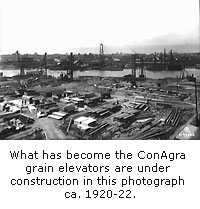White Gold on the Estuary

 Wheat
grown in California's Central Valley was called "white gold" because of
the hard, dry, white grains produced by the dry valley summers. The
Oakland Estuary became a central grain shipping hub. In the 1870s,
nearly 400 vessels a year docked at the Long Wharf to pick up wheat,
brought in by rail, for shipment to Europe. In 1922, two cooperative
grain elevators were built on the Estuary to encourage consolidated bulk
shipment of grain. The elevators have a capacity of 1.2 million bushels
of wheat. By the 1930s, a flour mill had been built around the
elevators.
Wheat
grown in California's Central Valley was called "white gold" because of
the hard, dry, white grains produced by the dry valley summers. The
Oakland Estuary became a central grain shipping hub. In the 1870s,
nearly 400 vessels a year docked at the Long Wharf to pick up wheat,
brought in by rail, for shipment to Europe. In 1922, two cooperative
grain elevators were built on the Estuary to encourage consolidated bulk
shipment of grain. The elevators have a capacity of 1.2 million bushels
of wheat. By the 1930s, a flour mill had been built around the
elevators.
Currently operated by ConAgra, the flour mill produces over a million
pounds of flour per day. Employees work around the clock to mill flour
and ship their product by rail and truck all over the West. You can spot
this large industrial operation just south of Embarcadero Cove. Look for
the ConAgra sign on the side of the building.
Deborah Cooper
Oakland Museum of California
 "Walk Along the Water"
"Walk Along the Water"
© Oakland Museum of California, used with permission.

 Explore this
Topic:
Explore this
Topic:
 2009 photograph of ConAgra grain
elevators - Waterfront Action
2009 photograph of ConAgra grain
elevators - Waterfront Action
 back to history map
back to history map